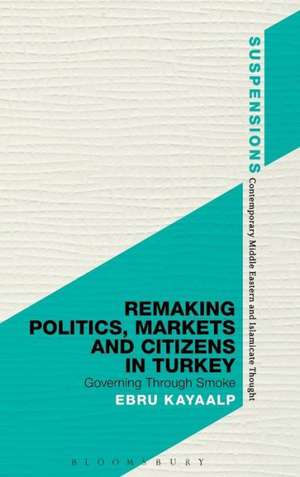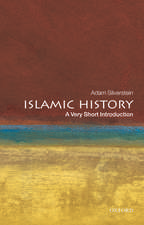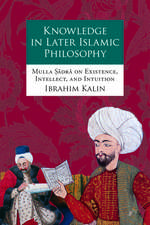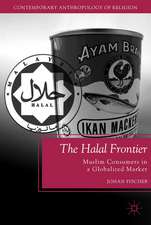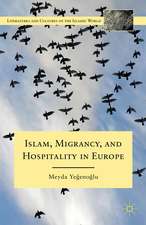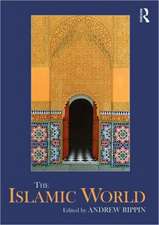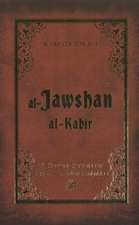Remaking Politics, Markets, and Citizens in Turkey: Governing Through Smoke: Suspensions: Contemporary Middle Eastern and Islamicate Thought
Autor Dr. Ebru Kayaalpen Limba Engleză Hardback – 17 dec 2014
| Toate formatele și edițiile | Preț | Express |
|---|---|---|
| Paperback (1) | 256.85 lei 6-8 săpt. | |
| Bloomsbury Publishing – 29 iun 2016 | 256.85 lei 6-8 săpt. | |
| Hardback (1) | 773.45 lei 6-8 săpt. | |
| Bloomsbury Publishing – 17 dec 2014 | 773.45 lei 6-8 săpt. |
Din seria Suspensions: Contemporary Middle Eastern and Islamicate Thought
- 28%
 Preț: 405.76 lei
Preț: 405.76 lei - 22%
 Preț: 237.28 lei
Preț: 237.28 lei - 23%
 Preț: 172.99 lei
Preț: 172.99 lei - 12%
 Preț: 216.16 lei
Preț: 216.16 lei - 30%
 Preț: 567.99 lei
Preț: 567.99 lei - 22%
 Preț: 256.20 lei
Preț: 256.20 lei - 13%
 Preț: 257.50 lei
Preț: 257.50 lei - 22%
 Preț: 256.85 lei
Preț: 256.85 lei - 23%
 Preț: 171.39 lei
Preț: 171.39 lei - 13%
 Preț: 229.05 lei
Preț: 229.05 lei - 13%
 Preț: 257.50 lei
Preț: 257.50 lei - 13%
 Preț: 238.76 lei
Preț: 238.76 lei - 13%
 Preț: 257.97 lei
Preț: 257.97 lei - 22%
 Preț: 231.81 lei
Preț: 231.81 lei - 22%
 Preț: 224.21 lei
Preț: 224.21 lei - 23%
 Preț: 198.12 lei
Preț: 198.12 lei - 23%
 Preț: 198.68 lei
Preț: 198.68 lei - 24%
 Preț: 188.82 lei
Preț: 188.82 lei
Preț: 773.45 lei
Preț vechi: 990.26 lei
-22% Nou
Puncte Express: 1160
Preț estimativ în valută:
147.100€ • 154.94$ • 122.46£
147.100€ • 154.94$ • 122.46£
Carte tipărită la comandă
Livrare economică 05-19 aprilie
Preluare comenzi: 021 569.72.76
Specificații
ISBN-13: 9781472508737
ISBN-10: 1472508734
Pagini: 232
Dimensiuni: 156 x 234 x 14 mm
Greutate: 0.5 kg
Editura: Bloomsbury Publishing
Colecția Bloomsbury Academic
Seria Suspensions: Contemporary Middle Eastern and Islamicate Thought
Locul publicării:London, United Kingdom
ISBN-10: 1472508734
Pagini: 232
Dimensiuni: 156 x 234 x 14 mm
Greutate: 0.5 kg
Editura: Bloomsbury Publishing
Colecția Bloomsbury Academic
Seria Suspensions: Contemporary Middle Eastern and Islamicate Thought
Locul publicării:London, United Kingdom
Caracteristici
Fills gap for anthropological research in Muslim countries on relationship between local and global economies
Notă biografică
Ebru Kayaalp is Assistant Professor at Istanbul Sehir University, Turkey.
Cuprins
IntroductionPart I: Politics1. Travel of Experts, Policies and Institutions2. Opening the Black Box of Law3. Policy in the MakingPart II: Markets4. Remaking the Tobacco Market5. Borders or the MarketPart III: Citizens6. Neoliberalism, Citizenship and Resistance7. Making Healthy Good Citizens8. Smoking Tobacco, Speaking Nationalism ConclusionBibliographyIndex
Recenzii
A rare example of ethnographic research in which the reader will find everything in one place.
A must-read for students of modern Turkey focusing on political economy, economic anthropology, and science and technology studies.
From the more than two decades of debates, theories, and examples of what it is to produce ethnographic studies of neoliberal political economies, Kayaalp's study of the shifting assemblages around the making of tobacco markets in contemporary Turkey, is the one I would (and will) select to teach the state of anthropology's art in this major collective contemporary research project of the discipline. With elegance, she encompasses the global phenomenon as a closely observed dynamic form, an affair of experts with profound effects on the commitments of states, while keeping 'local knowledge' a little offside, but still in a place of honor.
Ebru Kayaalp's book is a wonderful blend of classic and contemporary ethnography that charts the complicated recent history of Turkey's economy through the lens of a single commodity: tobacco. By doing what anthropologists do best, she paints a portrait of Turkey and its economy today. She shows us how markets are made and unmade, and how they transform politics and remake citizenship in the process. Markets, like smoke, sometimes seem impossible to grasp, but with a book like this, a reader can explore in detail the complex range of institutions, laws, regulations, plants, criminals, bureaucrats, doctors and cigarettes making up the markets in smoke. It is a significant achievement and an engaging read.
A must-read for students of modern Turkey focusing on political economy, economic anthropology, and science and technology studies.
From the more than two decades of debates, theories, and examples of what it is to produce ethnographic studies of neoliberal political economies, Kayaalp's study of the shifting assemblages around the making of tobacco markets in contemporary Turkey, is the one I would (and will) select to teach the state of anthropology's art in this major collective contemporary research project of the discipline. With elegance, she encompasses the global phenomenon as a closely observed dynamic form, an affair of experts with profound effects on the commitments of states, while keeping 'local knowledge' a little offside, but still in a place of honor.
Ebru Kayaalp's book is a wonderful blend of classic and contemporary ethnography that charts the complicated recent history of Turkey's economy through the lens of a single commodity: tobacco. By doing what anthropologists do best, she paints a portrait of Turkey and its economy today. She shows us how markets are made and unmade, and how they transform politics and remake citizenship in the process. Markets, like smoke, sometimes seem impossible to grasp, but with a book like this, a reader can explore in detail the complex range of institutions, laws, regulations, plants, criminals, bureaucrats, doctors and cigarettes making up the markets in smoke. It is a significant achievement and an engaging read.
